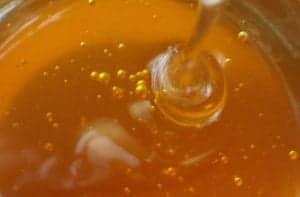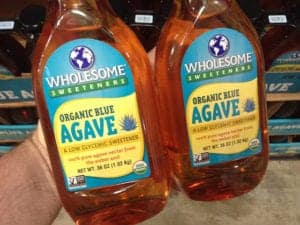Like this video? Subscribe to our YouTube channel by clicking here.
Sugar, artificial sweeteners, natural sweeteners — there seem to be nearly countless, often confusing, sweetener options out there. But which one should you choose? The answer may not be as clear as you had hoped.

By judging the different sweetener options by their score on the glycemic index, you may be able to find some much needed answers and clarification. The glycemic index — using a scale between zero and 100 — assigns a value to foods based on how slowly or quickly they can increase blood glucose levels, otherwise knowns as “blood sugar.” High blood glucose levels, in some cases, can cause blindness, kidney failure and cardiovascular diseases. People with diabetes especially need to monitor their blood sugar levels.
Related: Artificial Sweeteners Are the New Sugar Fix for Kids
High-glycemic foods include white bread, potatoes, breakfast cereals and even watermelon. Regularly eating foods like these that score high on the glycemic index also comes at another price — they can cause more cravings and trigger parts of your brain linked to addiction, according to research.
In other words, sugar really is addictive. But what’s even more difficult and confusing is picking the right sugar substitute that will still satisfy your sweet tooth without spiking your blood glucose levels too high.
Natural Sugar Substitutes
Honey

Honey has been a favorite natural sugar substitute for years and for good reason. Honey is naturally sweeter than sugar, so you’ll need less of it. Honey is made out of fructose, glucose, water and minerals such as iron, calcium and magnesium. Generally, honey has a relatively moderate score on the glucose index — it has a value of 55. However, honey is high in calories, so use it sparingly.
Agave

Agave is another popular natural sugar substitute. Agave has a lower score on the glycemic index than regular table sugar, but it also has much more fructose than sugar. Fructose is metabolized differently by the body compared to glucose. Instead of being converted into metabolic energy by the cells like glucose, fructose is processed mostly by the liver. Meaning, in the short-term agave does not spike blood sugar levels, but the fructose can send your liver — which is the only organ that can process high amounts of fructose — into overdrive and turn it into fat. In the long-term, high amounts of fructose can contribute to insulin resistance. So don’t believe the hype; agave is not always the healthiest alternative to sugar.
Artificial Sugar Substitutes
Aspartame

Aspartame is a very popular artificial sugar substitute — it’s a common ingredient in many diet sodas as well as brands like Equal and NutraSweet. Although it’s considered a safe zero-calorie sugar substitute by the U.S. Food and Drug Administration (FDA) that does not spike blood glucose levels, there is still quite a bit of controversy surrounding it. Some studies have claimed that aspartame can lead to cancer, while others say the evidence linking aspartame to cancer is inconclusive. Aspartame has also been allegedly linked to causing depression and weight gain.
Saccharin

Saccharin, like aspartame, is another popular artificial sugar substitute that has zero calories and does not spike the glycemic index. Common brands include Sweet ‘N Low and SugarTwin. There is a bit of controversy around saccharin — some studies have linked it to cancer and other health problems. However, other studies have found that saccharin may even be used in a potential cancer treatment.
Sucralose

Sucralose is most commonly found in Splenda — one of the most popular and common artificial sugar replacement brands. However, the next time you reach for a packet of Splenda, know that sucralose is made by replacing certain atoms in sugar with atoms of chlorine — yes, that chemical used to disinfect swimming pools. It’s also about 600 times as sweet as sugar, but it does not contain any calories because it passes through the body without being digested. Sucralose is considered to be safe by the FDA, although there have been some studies linking it to certain cancers. As far as the glycemic index is concerned, it does not spike blood sugar levels.
Natural Sugar Substitutes That Won’t Spike Blood Sugar
Xylitol

Despite having a name that may sound as though it were a chemical, xylitol is natural extract from hardwood trees and the fibers of some fruits and vegetables. It also has a very similar taste and look to sugar, but has fewer calories and is very low on the glycemic index. Xylitol is most often used in ‘sugar-free’ gum and mints. Another plus — xylitol, unlike sugar, is not converted in the mouth to acids that can cause cavities and tooth decay. It’s a win-win all around.
Stevia

Stevia comes from leaves of the stevia rebaudiana plant that grows in warm climates. In its natural form, stevia has neither carbohydrates nor calories and doesn’t raise blood sugar levels. However, stevia is typically sold as a processed sugar substitute which only uses some active ingredients from the plant. Common store brands include Pure Via, Sweet Leaf, Stevia in the Raw, and Truvia.
Related: Is The Sugar Industry Misleading You About Diabetes?
Danielle Tarasiuk is a multimedia journalist based in Los Angeles. Her work has been published on AllDay.com, Yahoo! Sports, KCET, and NPR-affiliate stations KPCC and KCRW. She’s a proud Sarah Lawrence College and USC Annenberg alumn.


![How To: ‘Fix’ Crepey Skin [Watch]](https://cdn.vitalupdates.com/wp-content/uploads/2017/05/bhmdad.png)












